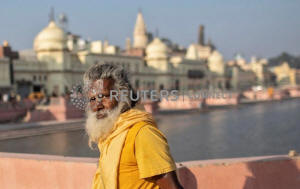With Indian court ruling, Modi's Hindu-first agenda barrels forward
 Send a link to a friend
Send a link to a friend
 [November 11, 2019]
By Mayank Bhardwaj and Alexandra Ulmer [November 11, 2019]
By Mayank Bhardwaj and Alexandra Ulmer
AYODHYA/MUMBAI (Reuters) - Just six months
after sweeping to re-election, Indian Prime Minister Narendra Modi has
delivered on two major promises of his Hindu-first agenda, electrifying
his base but sowing unease among liberals and the nation's Muslim
minority.
The latest boost for Modi came on Saturday, when the Supreme Court
handed Hindu groups control of a contested site where a 16th-century
mosque was razed over two decades ago, paving the way for the
construction of a temple there that has long been an election promise of
the ruling Bharatiya Janata Party (BJP).
That followed New Delhi's move in August to strip Muslim-majority Jammu
and Kashmir of its special status as a state in what Modi's government
said was a bid to integrate the restive region with the rest of
predominantly-Hindu India.
Now, the BJP may move towards delivering on its third traditional plank:
Creating a uniform civil code that does away with the independence of
religious communities.

"After just a few months of Modi 2.0, they've accomplished two out of
three (main cultural objectives). It's quite possible that they will
accomplish all three by next year," said Milan Vaishnav, a senior fellow
at the Carnegie Endowment for International Peace in Washington D.C.
"It's striking that the government has moved with a clarity of purpose
on its social agenda that's completely absent when it comes to economic
matters," added Vaishnav in reference to the slowing of the country's
once red-hot economic growth.
Many Muslims have watched with a mix of fear and resignation as the BJP
has morphed into the officially secular country's near-undisputed
political force.
The controversial site in the northern state of Uttar Pradesh has been
one of the most explosive issues in the nation of 1.3 billion, where
Muslims constitute about 14% of the population.
In 1992, a rally led by the BJP and affiliate organizations spiraled out
of control and a Hindu mob destroyed the Babri Masjid or mosque in the
city of Ayodhya. That triggered riots in which about 2,000 people, most
of them Muslims, were killed across the country.
In its verdict on Saturday, the Supreme Court called the mosque's
demolition illegal but handed the plot of land to Hindus, who believe
the site is the birthplace of Lord Ram, a much venerated god-king. The
court directed that another plot in Ayodhya be provided to a Muslim
group that contested the case.
In over a dozen interviews, Muslim community leaders, businessmen, and
students said they respected the verdict but it exacerbated their sense
of alienation.
"Why did the court then give a ruling which is completely one-sided? Was
the court under pressure? We don't know. We can't trust anyone now. No
door is open for us," said local Muslim community leader Azam Quadri
during evening prayers in Ayodhya.
"BEST TO BE NUMB"
While Modi himself has said the court verdict should not be seen as a
"win or loss" for anyone, many Muslims Reuters spoke to expressed
resignation after the ruling.
[to top of second column]
|

A Hindu priest leaves after performing prayers on the banks of
Sarayu river after Supreme Court's verdict on a disputed religious
site, in Ayodhya, India, November 11, 2019. REUTERS/Danish Siddiqui

Some were bitter that a probe into the demolition has inconclusively
dragged on for three decades and that many of the politicians
accused of conspiring to take down the mosque are prominent BJP
members. Those people have said the demolition was spontaneous and
not planned.
"I feel humiliated by the Supreme Court verdict," said one affluent
Mumbai-based Muslim businessman, who declined to give his name.
"Others don't care. They have become numb. It's best to be numb in
Modi's India."
Some people believe that Hindu nationalists, galvanized by the
Ayodhya triumph, could turn their attention to two other Uttar
Pradesh mosques they believe Mughal conquerors built over the
remains of Hindu temples centuries ago.
"This (verdict) seems to generate incentives for Hindus to take down
mosques and resettle," said Neelanjan Sircar, an assistant professor
at Ashoka University near New Delhi.
Another likely move is the uniform civil code.
New Delhi has already taken steps toward creating such a code, with
the BJP-led parliament in July outlawing the centuries-old right of
a Muslim man to instantly divorce his wife. While many activists
thought the Muslim custom was wrong, some Muslim groups said Modi
was targeting them while turning a blind eye to discrimination in
Hindu society.
Despite the focus on social issues, political analysts predict the
government and the BJP will have to shift attention quickly to a
sagging economy and surging unemployment or risk losing popular
support.

India, long touted as the world's fastest-growing large economy, has
seen economic expansion wither to six-year lows.
Two college students - one Hindu, one Muslim - in Uttar Pradesh's
capital Lucknow separately said after the court verdict that they
hoped the government would now focus on economic issues.
"This case has gone on for so long... Now that it's done with
altogether, maybe more economic issues can come forward", said Rajat
Mishra, a business student.
"Attention can now move beyond topics of religion," said medical
student Irfan, 22, who declined to give his surname.
(Additional reporting by Rupam Jain and Abhirup Roy in Mumbai,
Kanishka Singh in Lucknow, Saurabh Sharma in Ayodhya and Nigam
Prusty in New Delhi; Writing by Alexandra Ulmer)
[© 2019 Thomson Reuters. All rights
reserved.]
Copyright 2019 Reuters. All rights reserved. This material may not be published,
broadcast, rewritten or redistributed.
Thompson Reuters is solely responsible for this content. |